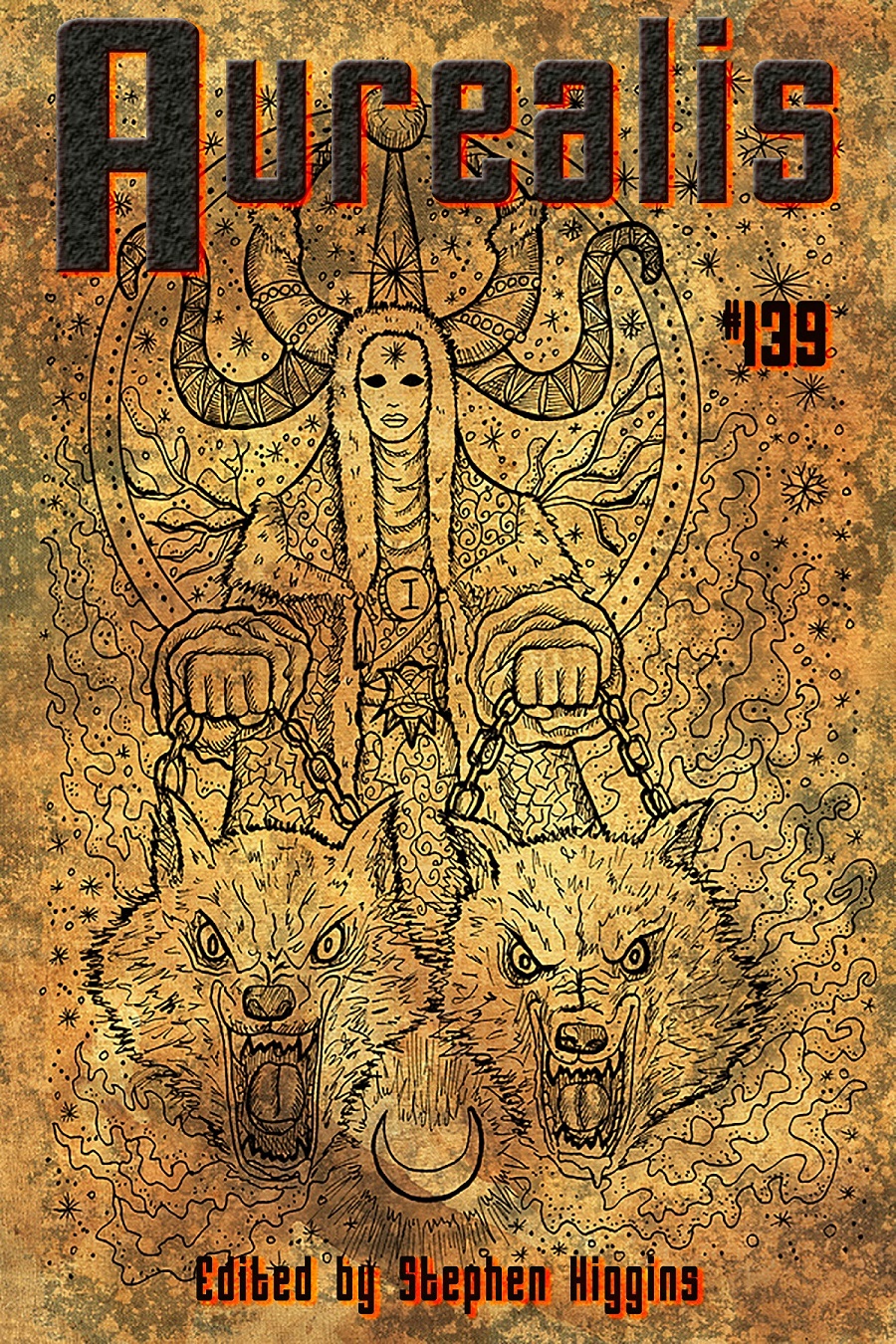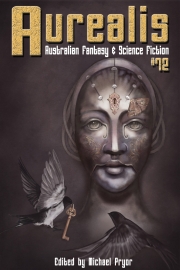Aurealis #139
$3.99
Aurealis #139 is the latest issue from Australia’s premier genre magazine. AS per usual it features intriguing new fiction, provocative articles, news and reviews as well as stunning art work.
- From the Cloud — Stephen Higgins
- Every Nook and Cranny — Daniel Baker
- Taxman — Georgia Angus
- All That Perfect Blue — Lora Gray
From the Cloud
Stephen Higgins
Many people in the Aurealis world know that I recently underwent knee replacement surgery. It isn’t something I would recommend unless you really needed it but I guess very few would consider undergoing it unless they really had to do so. So now a part of me is titanium. If I had a dollar for every time someone said, ‘We can rebuild you. We have the technology!’ I would have an extra two dollars. If I had the knee replacement surgery even 20 years ago, I would have made a lot more money. Back then, a lot more people would have made the connection to the TV show The Six Million Dollar Man. It was a huge show back in the 70s and it concerned the adventures of a man who had been enhanced with all sorts of technology. Anyway, all of this this got me thinking (again) about the longevity of science fiction and fantasy in various forms of media.
I have long bemoaned the fact the musical acts generally have limited shelf life these days. Bands and artists do not seem to be able to grow and mature in their craft over a long period of time. Of course, there are some who do. I’m making a rash generalisation in order to make a point, but the individuals who do build a career over time seem to have to push product out regularly in order to maintain their position. So we have albums that are perhaps a bit underdone and padded out released every few months, or novels that need more work or editing being released.
I am sure this is related the rise of digital media and, in the case of music, to the increase of streaming services. I record music myself and all of the advice I’ve received advocates the release of plenty of product on a regular basis, simply to keep your name in front of your audience. I’ve released an album a year over the last 3 years and that’s considered a very limited output. Fortunately, it isn’t my main source of income (or even a source of income!) and I can pretty much do whatever I want. But even as a consumer of music I find myself flitting over various artist streams and rarely really explore an artist’s release. Even major releases from major artists seem to suffer this fate. Last year, Bob Dylan released an album of original material for the first time in ages. It was a landmark day in recording history and for a few days it was a big deal in various online discussion groups. Then it was all over and forgotten.
The same seems to occur in the publication of science fiction and fantasy. Major books by noted authors are released, and then they seem to disappear. I’ve been told that this phenomenon is a partly due to the sheer amount of product being released and I’m sure that this is a part of the problem. The digital age has made everyone a journalist, photographer, columnist, musical artist, author, artist, etc. That’s the democratisation of the arts. Everyone might have a platform, but who gets heard? Everyone gets their moment in the spotlight, but that moment is being shortened.
This seems to be a very downbeat editorial. It might be the drugs! Fortunately, all of the digital issues of Aurealis are still available. If you need more than your monthly dose of Aurealis you might want to try some of the earlier issues. See the website at www.aurealis.com.au.
All the best from the cloud!
Stephen Higgins
From Every Nook and Cranny by Daniel Baker:
Elli knew that a god couldn’t cost more than five buttons. Squatting in the shadows of Slaughter’s Folly, she watched the little shop on the corner Every Nook and Cranny stencilled black above its door. Nobody had gone in. Not even a forehead smudge on its darkened windows.
The day smelt like rain. Elli took a deep, steadying breath. Seven buttons were slippery in her hand. She didn’t have much, but she had the buttons. And she’d ruined her second dress for them and that dress had cost a scar under her left eye. The scar was worthless to anybody else, but those seven buttons were a fortune. Not a small one either: a big one. Elli could barely imagine how big. Big times big plus two, maybe. She darted across the laneway and, buttons in one hand, doorknob in the other, hoped they’d be enough.
From Taxman by Georgia Angus:
The deer was half-dead, sprawled across the ground like sackcloth. Misha stood over it, hatchet in hand. Her shadow lay across the deer’s heaving belly. It oozed blood from the wound her mother had dealt. Misha’s mother was the best shot with the crossbow and the strongest with the hatchet. She had felled it with her second shot. After they watched it fall through the scope, she had led her daughter over to where the deer lay.
The deer’s keening made Misha feel sick.
‘Show your teeth,’ Ma said. She was always saying that. ‘It helps. It’s okay to be afraid, but use that fear to do something. Finish the job at hand.’
From All That Perfect Blue by Lora Gray:
A flash of yellow, vivid as Technicolor Oz, and Frankie bursts through the ’porter into the Nevian desert. She hits the ground shoulder first, survival gear and spectrometers clattering around her. Beyond the ’porter’s light, Nevia is a field of grey pebbles on grey soil, grey mountains knuckling into a grey sky, tufts of grey flora spiking from clusters of grey rock.
There’s not a speck of blue in sight.
Frankie sighs and sits back on her heels, the gravity converters in her suit whining at the shift. She gives them a sharp smack. There’s a reluctant click, a whir, and the converters chug back into gear.
She really should have bought a new suit before ’porting off world. The air shushing through her filter tastes yeasty, the mesh lining is frayed and everything chafes. But she’s freelancing off-world colour patents these days and it would take months to save up for a new suit. She needs to record Nevian Blue now, before it’s too late and her dad can’t remember what it looks like anymore.
Behind her, the ’porter flickers and the door to Earth snaps shut.




